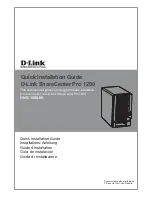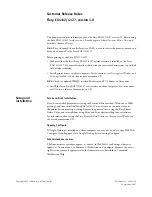
v
Follow
the
suggested
actions
in
the
order
in
which
they
are
listed
in
the
Action
column
until
the
problem
is
solved.
v
See
Chapter
3,
“Parts
listing,
Type
7981
and
1884,”
on
page
53
to
determine
which
components
are
customer
replaceable
units
(CRU)
and
which
components
are
field
replaceable
units
(FRU).
v
If
an
action
step
is
preceded
by
“(Trained
service
technician
only),”
that
step
must
be
performed
only
by
a
trained
service
technician.
Symptom
Action
The
monitor
has
screen
jitter,
or
the
screen
image
is
wavy,
unreadable,
rolling,
or
distorted.
1.
If
the
monitor
self-tests
show
that
the
monitor
is
working
correctly,
consider
the
location
of
the
monitor.
Magnetic
fields
around
other
devices
(such
as
transformers,
appliances,
fluorescent
lights,
and
other
monitors)
can
cause
screen
jitter
or
wavy,
unreadable,
rolling,
or
distorted
screen
images.
If
this
happens,
turn
off
the
monitor.
Attention:
Moving
a
color
monitor
while
it
is
turned
on
might
cause
screen
discoloration.
Move
the
device
and
the
monitor
at
least
305
mm
(12
in.)
apart.
Turn
on
the
monitor.
Notes:
a.
To
prevent
diskette
drive
read/write
errors,
make
sure
that
the
distance
between
the
monitor
and
any
diskette
drive
is
at
least
76
mm
(3
in.).
b.
Non-IBM
monitor
cables
might
cause
unpredictable
problems.
2.
Replace
the
monitor.
3.
Replace
the
management-module
in
the
BladeCenter
unit
(see
the
Hardware
Maintenance
Manual
and
Troubleshooting
Guide
or
Problem
Determination
and
Service
Guide
for
your
BladeCenter
unit).
4.
(Trained
service
technician
only)
Replace
the
system
board
assembly.
Wrong
characters
appear
on
the
screen.
1.
If
the
wrong
language
is
displayed,
update
the
firmware
or
operating
system
with
the
correct
language
in
the
blade
server
that
has
ownership
of
the
monitor.
2.
Replace
the
monitor.
3.
(Trained
service
technician
only)
Replace
the
system
board
assembly.
Network
connection
problems
v
Follow
the
suggested
actions
in
the
order
in
which
they
are
listed
in
the
Action
column
until
the
problem
is
solved.
v
See
Chapter
3,
“Parts
listing,
Type
7981
and
1884,”
on
page
53
to
determine
which
components
are
customer
replaceable
units
(CRU)
and
which
components
are
field
replaceable
units
(FRU).
v
If
an
action
step
is
preceded
by
“(Trained
service
technician
only),”
that
step
must
be
performed
only
by
a
trained
service
technician.
Symptom
Action
One
or
more
blade
servers
are
unable
to
communicate
with
the
network.
Make
sure
that:
v
The
switch
modules
for
the
network
interface
that
is
being
used
are
installed
in
the
correct
BladeCenter
bays
and
are
configured
and
operating
correctly.
See
the
Hardware
Maintenance
Manual
and
Troubleshooting
Guide
or
Problem
Determination
and
Service
Guide
for
your
BladeCenter
unit
for
details.
v
The
settings
in
the
switch
module
are
correct
for
the
blade
server
(settings
in
the
switch
module
are
specific
to
each
blade
server).
If
the
problem
remains,
see
“Solving
undetermined
problems”
on
page
49.
32
BladeCenter
HS20
Type
7981
and
1884:
Problem
Determination
and
Service
Guide
Summary of Contents for eServer BladeCenter HS20 Type 8832
Page 1: ...BladeCenter HS20 Type 7981 and 1884 Problem Determination and Service Guide ...
Page 2: ......
Page 3: ...BladeCenter HS20 Type 7981 and 1884 Problem Determination and Service Guide ...
Page 8: ...vi BladeCenter HS20 Type 7981 and 1884 Problem Determination and Service Guide ...
Page 16: ...xiv BladeCenter HS20 Type 7981 and 1884 Problem Determination and Service Guide ...
Page 68: ...52 BladeCenter HS20 Type 7981 and 1884 Problem Determination and Service Guide ...
Page 98: ...82 BladeCenter HS20 Type 7981 and 1884 Problem Determination and Service Guide ...
Page 110: ...94 BladeCenter HS20 Type 7981 and 1884 Problem Determination and Service Guide ...
Page 111: ......
Page 112: ... Part Number 31R1716 Printed in USA 1P P N 31R1716 ...
















































